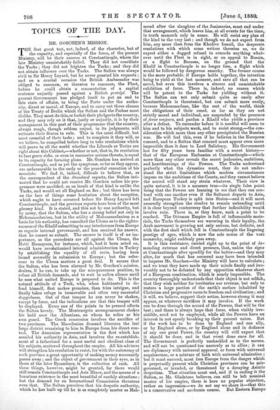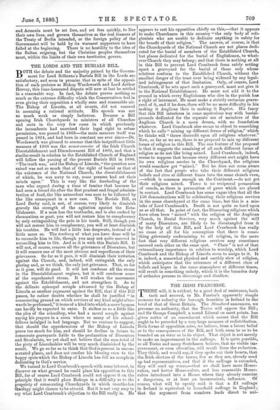TOPICS OF THE DAY.
MR. GOSCHEN'S MISSION.
THE first great test, not, indeed, of the character, but of the capacity, and especially of the force, of the present Ministry, will be their success at Constantinople, where the late Ministry unmistakably failed. They did not conciliate the Turks ; they did not frighten the Turks ; and they did not obtain influence over the Turks. The Sultan was always civil to Sir Henry Layard, but he never granted his requests ; and on a crucial occasion the British Ambassador was obliged to summon, or threaten to summon, the Fleet, before he could obtain a commutation of a capital sentence unjustly passed against a British protégé. The present Government has pledged itself to put an end to this state of affairs, to bring the Porte under the autho- rity, direct or moral, of Europe, and to carry out those clauses of the Treaty of Berlin which the Sultan and the Pashas most dislike. They must do this, or forfeit their pledges to the country, and they may rely on it that, justly or unjustly, it is by their management in this part of their programme that the country, always rough, though seldom unjust, in its judgments, will estimate their fitness to rule. This is the most difficult, but most essential of their tasks ; and to complete it they will, as we believe, be compelled before long to take resolutions which will prove to all the world whether the Liberals or Tories are right about this Cabinet,—whether or not, that is, its resolution to face grave risks, or even to encounter serious threats, is equal to its capacity for forming plans. Mr. Goschen has arrived at Constantinople, and as yet the symptoms, so far as they appear, are unfavourable to the early or the peaceful execution of his mandate. We find it, indeed, difficult to believe that, as the correspondent of the Standard reports, the Sultan inti- mated that he could not receive Mr. Goschen unless his pro- gramme were modified, as an insult of that kind is unlike the Turks, and would set all England on fire ; but there has been on the face of things some hesitation about the reception, which ought to have occurred before Sir Henry Layard left Constantinople, and the previous reports have been of the most gloomy kind. It is stated, and this not by one authority, but by many, that the Sultan, who has a strong belief not only in Mahommedanism, but in the utility of Mahommedanism as a basis for his authority, has consulted the Ulema as to the righte- ousness of the Khalif submitting to any interference from Europe as regards internal government, and has received for answer, that he cannot so submit. The answer in itself is of no im- portance, as the precedents are all against the Ulema, the Hatti Humayoon, for instance, which, had it been acted on, would have revolutionised internal administration in Turkey by establishing the equality of all sects, having been issued avowedly in submission to Europe ; but the refer- ence to the Ulema matters a great deal. It means that the Sultan, who has been alarmed by Mr. Goschen's mission, desires, if he can, to take up the non-possumus position, to refuse all British demands, and to wait in sullen silence until he sees what united Europe is prepared to do. This is the natural attitude of a Turk, who, when habituated to de- fend himself, first makes promises, then tries intrigue, and finally takes refuge in immovable and often very successful doggedness. Out of that temper he can never be shaken, except by force, and the indications are that this temper will be displayed. Every one of the points to be pressed affects the Sultan keenly. The Montenegrin arrangemement shakes his hold over the Albanians, on whom he relies as his own guard. The Greek concession involves the sacrifice of two provinces. The Macedonian demand liberates the last large district remaining to him in Europe from his direct con- trol. The Armenian representation is the first which has assailed his authority in Asia, and involves the re-establish- ment of a fatherland for a most useful and obedient class of his subjects, scattered throughout the empire. All his advisers will strengthen his resolution to resist, for with the autonomy of each province a great opportunity of making money necessarily passes away ; and the object of government in their eves, as in those of the later Byzantines, is the collection of cash. All these things, however, might be granted, for there would still remain Constantinople and Asia Minor, and the means of a luxurious existence in the most beautiful of earthly situations ; but the demand for an International Commission threatens even that. The Sultan perceives that his despotic authority, which he has built up till he is as completely master as Mah- mond after the slaughter of the Janissaries, must end under that arrangement, which leaves him, at all events for the time, in truth monarch only in name. He will resist any plan of the kind to the very last ; and though we do not expect from him, any more than from the Khedive Ismail, the desperate resolutions with which some writers threaten us, we do expect either a dogged refusal to concede anything what- ever until the Fleet is in sight, or an appeal to Russia, or a flight to Broussa, on the ground that the Khalif in Constantinople is no longer free, a flight which would be followed by dangerous anarchy. The former course is the more probable, if Europe holds together, the intention being to yield at the last moment, and save all that can be saved, but even this involves a sincere and unmistakable exhibition of force. There is, indeed, no reason which will be patent to the Turks for yielding without it. The Sultan can not only submit quite as easily after Constantinople is threatened, but can submit more easily,- because Mahommedans, like the rest of the world, think the obligations of their creed, so far as they are not strictly moral and individual, are suspended by the presence of force nzajeure, and pardon a Khalif who yields a province after a defeat. To surrender before it is needful will seem to him and to his subjects weak, and to resist strong,—the con- sideration which more than any other precipitated the Russian war. He will feel this, even if he believes in the European concord, and to a Sultan that concord must appear even more impossible than it does to Lord Salisbury. His Government has for fifty years been familiar with a secret history— that of the European Embassies at Constantinople—which more than any other reveals the secret jealousies, ambitions, and heartburnings of the Powers. The Turks understand perfectly what the dynasties want, they do not under- stand the strict limitations which modern circumstances impose on the ambitions of the Courts, and they cannot believe the accord will stand any strain whatever. Their view is quite natural, it is in a measure true—its single false point being that the Powers are learning to see that they can con- tend with one another even if the Sultanet departs to Asia,. and European Turkey is split into States—and it will most assuredly strengthen the resolve to remain unbending until it is clear beyond controversy that further inflexibility would involve ruin. There is, as they know, such a point to be reached. The Ottoman Empire is full of inflammable mate- rials, the Turks themselves are wavering in their loyalty, the Arab movement is growing not only serious, but definite, and with the first shell which fell in Constantinople the lingering prestige of ages, which is now the sole nexus of the vast monarchy, might suddenly pass away.
It is this resistance, carried right up to the point of de- manding extreme and direct pressure, that, unless the signs at Constantinople alter speedily for the better—and they may alter, for much that has occurred may have been intended to impress Mr. Goschen—the Ministry will have to calculate;. and we trust they have made up their minds finally and irre- vocably not to be defeated by any opposition whatever short, of a European combination, which is nearly impossible. The thoroughly understands that their object is not selfish, that they wish neither for territories nor revenue, but only to restore a large portion of the earth's surface inhabited by Christian and progressive races to freedom and civilisation; and it will, we believe, support their action, however strong it may appear, or whatever sacrifices it may involve. If the work can be done through the accord of the Powers, that will be the best ; and there is always hope that force, when visibly irre- sistible, need not be employed, while all the Powers have an interest in not openly breaking up their present union. But if the work has to be done by England and one ally, or by England alone, or by England alone and in defiance of any one great Power, the country will still expect that it should be done, and in that event done once for all. The Government is perfectly unshackled as to the means, and will not be questioned too narrowly as to allies ; it can use diplomacy with universal approval, or force with universe} acquiescence, or a mixture of both with universal admiration ; but it must succeed, must free Europe from the danger which is perpetually present while Christian provinces can be mis- governed, or invaded, or threatened by a decaying Asiatic. despotism. That situation must end, and if in ending it the Sultan, as Mr. Gladstone believes, can still be left nominal master of his empire, there is here no popular objection, rather an impression—we do not say we share it—that this is a conservative and .moderate course. But Eastern Europe
and Armenia must be set free, and set free quickly, to live their own lives, and govern themselves as the real framers of the Treaty of Berlin intended, or the foreign policy of the Government will be held by its warmest supporters to have failed at the beginning. There is no hostility to the idea of the Sultan reigning, but the Christian peoples themselves must, within the limits of their own territories, govern.



































 Previous page
Previous page